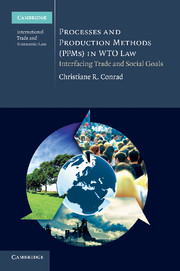Book contents
- Frontmatter
- Contents
- List of figures and tables
- Preface and acknowledgements
- Table of GATT 1947 Reports
- Table of WTO Reports
- List of abbreviations
- Introduction
- I Foundations: the relevance of NPA measures at the interface of domestic regulation, economic globalization and world trade law
- II Legal analysis: reviewing the status of NPA measures de lege lata
- 3 Preliminary considerations: applicability of WTO law and other international law to NPA measures
- 4 Consistency with GATT obligations
- 5 Limits to the justification of NPA measures under the general exceptions
- 6 The status of PPM measures under the TBT Agreement and the SPS Agreement
- III Outlook: new perspectives on the legal status of NPA measures
- Summary and concluding remarks
- Bibliography
- Index
5 - Limits to the justification of NPA measures under the general exceptions
Published online by Cambridge University Press: 05 June 2011
- Frontmatter
- Contents
- List of figures and tables
- Preface and acknowledgements
- Table of GATT 1947 Reports
- Table of WTO Reports
- List of abbreviations
- Introduction
- I Foundations: the relevance of NPA measures at the interface of domestic regulation, economic globalization and world trade law
- II Legal analysis: reviewing the status of NPA measures de lege lata
- 3 Preliminary considerations: applicability of WTO law and other international law to NPA measures
- 4 Consistency with GATT obligations
- 5 Limits to the justification of NPA measures under the general exceptions
- 6 The status of PPM measures under the TBT Agreement and the SPS Agreement
- III Outlook: new perspectives on the legal status of NPA measures
- Summary and concluding remarks
- Bibliography
- Index
Summary
Article XX contains a list of general exceptions to GATT obligations for measures relating to certain public policies. The list of privileged public policies contains general governmental ‘police’ and ‘welfare powers’, such as the protection of life and health, national treasures, public morals, and other policies such as customs enforcement and trade with gold and silver. Measures pursuing any of the listed policies can be justified under Article XX if they conform to the requirements set out in the opening paragraph or chapeau. As is apparent from the title ‘general exceptions’ and strong language used in this provision the exceptions apply to all material GATT obligations. Since the listed public policies in this sense override obligations, Article XX recognizes that the ability of any sovereign nation to act and promote the listed policy purposes is more important, even if such action is in conflict with various GATT obligations. Thus, the general exceptions are an expression and application of the sovereignty principle. They have the same status as other principles and norms and are indispensable for a well-balanced multilateral trading system.
Since NPA measures that violate GATT obligations will often be linked to public policies, Article XX is of utmost importance to their legal status. The list of public policies drafted by GATT negotiators in 1947, however, reflects the concerns of that time and thus appears in part anachronistic. It is therefore questionable whether the particular exceptions are adequate and sufficient to enable states to meet contemporary challenges.
- Type
- Chapter
- Information
- Processes and Production Methods (PPMs) in WTO LawInterfacing Trade and Social Goals, pp. 247 - 373Publisher: Cambridge University PressPrint publication year: 2011

